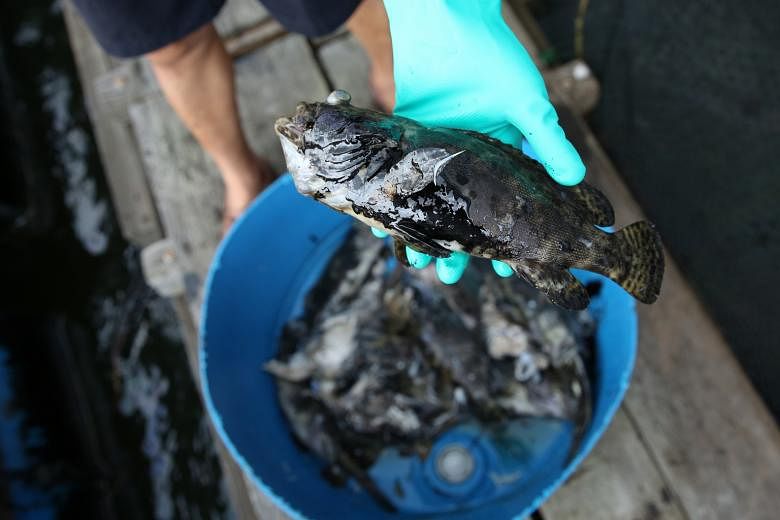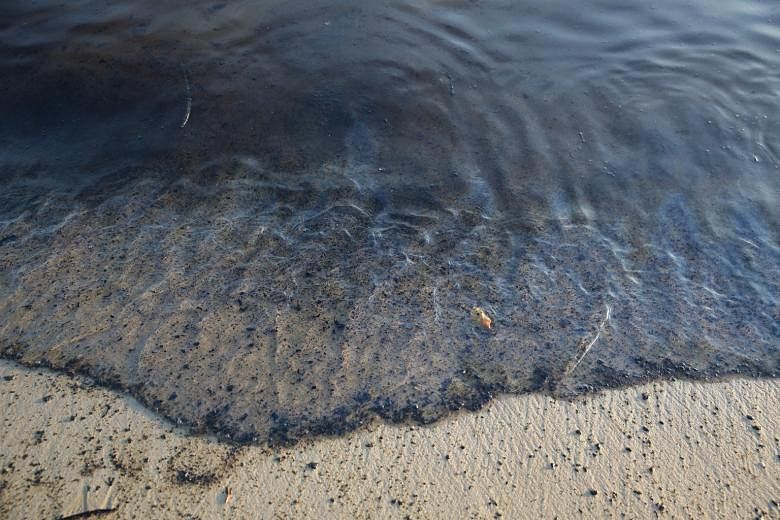A stretch of Changi Beach remains closed to beachgoers in the aftermath of an oil spill that has stained Singapore's shores.
Work is under way on about 800m of the beach to detoxify the oil-streaked sands there.
The sand, contaminated with oil spilt after two vessels collided in Johor waters on Tuesday, will be incinerated to destroy the oil and other hazardous material in it.
This is a common way of clearing oil spills on land.
About two tonnes of the Changi sand were sent for incineration at NSL OilChem Waste Manage- ment's plant in Boon Lay yesterday.
An NSL spokesman told The Straits Times: "The resulting ash and sand will be further tested to meet (National Environment Agency) compliance requirements before disposing it at the landfill on Pulau Semakau."
The company has been treating, recycling and disposing of oily waste in Singapore since 1997, and was engaged by a National Environment Agency (NEA) sub-contractor to deal with the oil-contaminated soil at Changi Beach, one of the areas affected.
Other beaches at Punggol and Pasir Ris on the mainland were also affected. Pulau Ubin and Coney Island - two of Singapore's offshore islands - were hit by the spill as well.
Of these beaches, Changi seemed to be worst hit. Cleanup operations at Coney Island, Pasir Ris and Punggol beaches have been completed.
Cleaning was still under way at Pulau Ubin's Noordin Beach yesterday, but this area has been closed to the public since 2013 for shore restoration works.
When The Straits Times visited the beach next to the Changi Village Hawker Centre yesterday, the red-and-white tape to block off access was still up, with signs placed every 10m or so warning people to stay out of the water.
NEA said on Thursday that the affected stretch will be temporarily closed to beachgoers "until further notice" to facilitate the cleanup.
One beachgoer, Mr Lawrence Fong, 57, said the smell of fuel was distracting, although the closure did not affect him as he does not swim there.
"But I suppose it would be a major disruption for people who spend time here with their families," said Mr Fong, a project manager.
"It gets very crowded here on the weekends with people relaxing and enjoying the scenery, fishing."
Mr Adrian Koh, who operates the Bistro@Changi cafe along the affected stretch, estimates that the spill caused a 30 per cent drop in customers.
"We have some people who came in, but left as the smell of (fuel) was very strong," he said.
Fish farms along the affected East Johor Strait are also adopting a wait-and-see approach to assess damage.
Mr Timothy Ng, operations manager of 2 Jays, one of the affected farms, said oil spills do not directly impact the fish.
But he estimated that he has lost 20kg of stock - or about 30 fish - so far.
His farm is one of 12 that the Agri-Food and Veterinary Authority (AVA) has asked to stop sales while tests are ongoing.
The suspension will be in place until food safety evaluations are complete, said AVA, and fish on the market is safe for consumption.
The Maritime and Port Authority of Singapore, which is coordinating cleanup efforts, said it could not yet estimate the cleanup costs.
However, good progress has been made in containing and cleaning up the spillage and no new patches of oil have been spotted along the East Johor Strait, it said.
VIDEO: Cleanup efforts continue at Changi Beach http://str.sg/4Pbe






